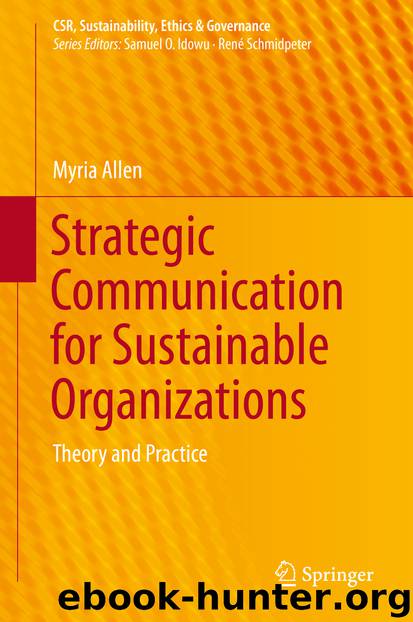Strategic Communication for Sustainable Organizations by Myria Allen

Author:Myria Allen
Language: eng
Format: epub
Publisher: Springer International Publishing, Cham
5.2.2.3 Systems Thinking
In the nineteenth century biologist Ludwig von Bertalanffy developed general systems theory. In the late twentieth century, the theory was adopted by multiple disciplines. It has proven especially useful for natural sciences, communication (Littlejohn 2009), and organizational researchers. Systems theory focuses us on how a system is a set of integrated and interacting parts that together create a larger whole. Poole (2014) provides an excellent summary of the theory and its influence on organizational communication research and practice. All systems have four aspects—objects (i.e., parts or elements), attributes (i.e., characteristics of the object and the system), internal relationships (i.e., patterns of relationships), and an environment (i.e., influences that impact the system). Systems are distinguished by three qualities—wholeness and interdependence, hierarchy, and self-regulation and control.
This chapter’s initial focus was based on the systems theory idea that organizations import resources from their external environments which help them adapt to conditions in their macro-environments (e.g., changing norms, new technologies, climate changes). It is important that people within an organization engage in systems thinking (Oncica-Sanislav and Candea 2010). Often we tend to focus on the parts rather than the whole and fail to see an organization as a dynamic long-term process existing within a macroenvironment.
Systems Theory, the City of Portland, and the City and County of Denver
Knowledge of systems theory made an important impact of Susan Anderson’s, Director of Portland’s Bureau of Planning and Sustainability, thinking—especially the ideas of wholeness and interdependence. When I asked her how she personally defined sustainability, Susan said:I define it as two simple things. The first is everything is connected—the environment, economy, jobs, our personal health, the community’s health. If you mess up one piece, somehow down the road the other pieces will get messed up. The second idea is that everything you do today effects tomorrow—how you got here, what clothes you have on, the foods you eat, the car you drove, the table we are sitting at, the building we are in. Everything. The decisions we make about our children, our families, our businesses, they all have an impact on tomorrow. If we do things right, we may have a better tomorrow and if we do things wrong, we leave a big mess for our kids to clean up. Everything is connected and you cannot run the jobs program without having some environmental and health impacts. You can’t run a health program without job impacts. People tend to think in silos because we are human and it is hard to think of more than one thing at a time. We have to think about the connections… To me, sustainability is about those connections.
Download
This site does not store any files on its server. We only index and link to content provided by other sites. Please contact the content providers to delete copyright contents if any and email us, we'll remove relevant links or contents immediately.
| Automotive | Engineering |
| Transportation |
Whiskies Galore by Ian Buxton(42014)
Introduction to Aircraft Design (Cambridge Aerospace Series) by John P. Fielding(33128)
Small Unmanned Fixed-wing Aircraft Design by Andrew J. Keane Andras Sobester James P. Scanlan & András Sóbester & James P. Scanlan(32800)
Craft Beer for the Homebrewer by Michael Agnew(18245)
Turbulence by E. J. Noyes(8047)
The Complete Stick Figure Physics Tutorials by Allen Sarah(7373)
The Thirst by Nesbo Jo(6944)
Kaplan MCAT General Chemistry Review by Kaplan(6933)
Bad Blood by John Carreyrou(6621)
Modelling of Convective Heat and Mass Transfer in Rotating Flows by Igor V. Shevchuk(6440)
Learning SQL by Alan Beaulieu(6289)
Weapons of Math Destruction by Cathy O'Neil(6279)
Man-made Catastrophes and Risk Information Concealment by Dmitry Chernov & Didier Sornette(6019)
Digital Minimalism by Cal Newport;(5764)
Life 3.0: Being Human in the Age of Artificial Intelligence by Tegmark Max(5558)
iGen by Jean M. Twenge(5415)
Secrets of Antigravity Propulsion: Tesla, UFOs, and Classified Aerospace Technology by Ph.D. Paul A. Laviolette(5371)
Design of Trajectory Optimization Approach for Space Maneuver Vehicle Skip Entry Problems by Runqi Chai & Al Savvaris & Antonios Tsourdos & Senchun Chai(5068)
Pale Blue Dot by Carl Sagan(5007)
